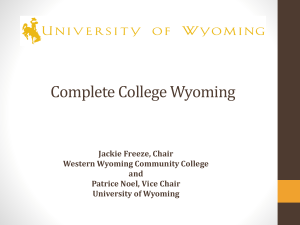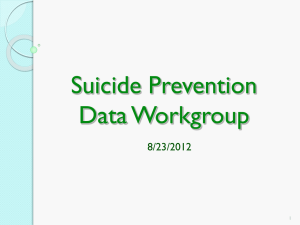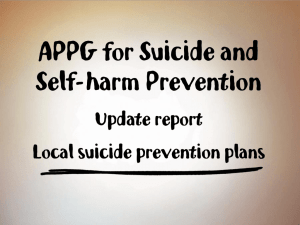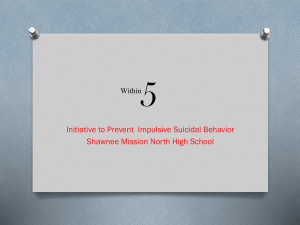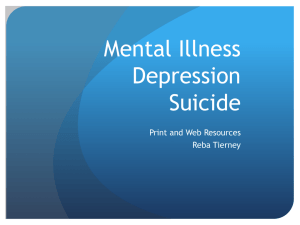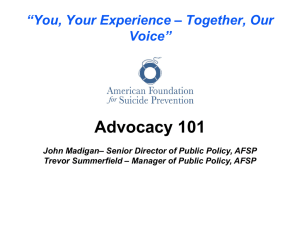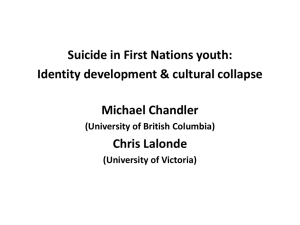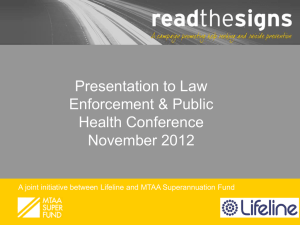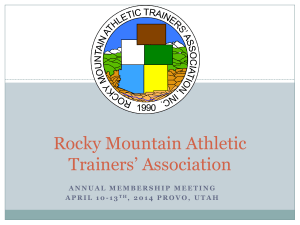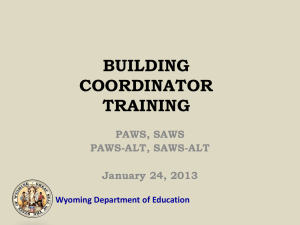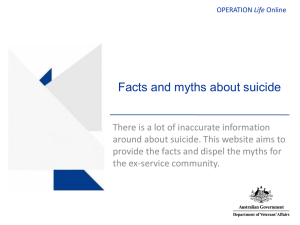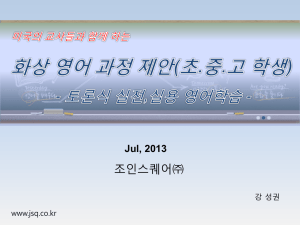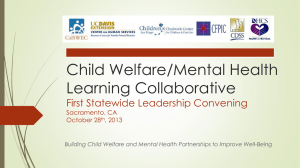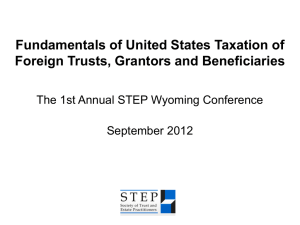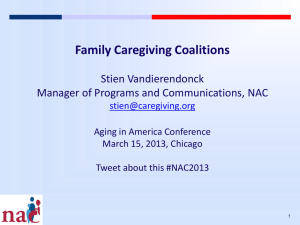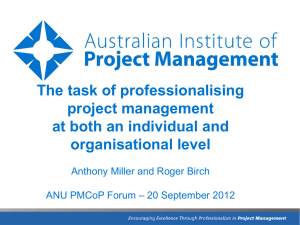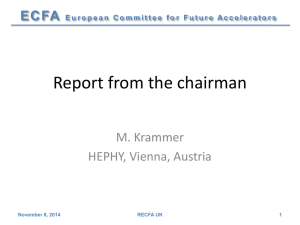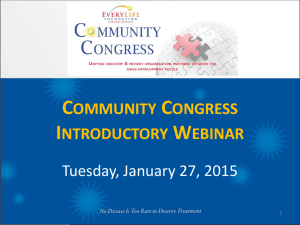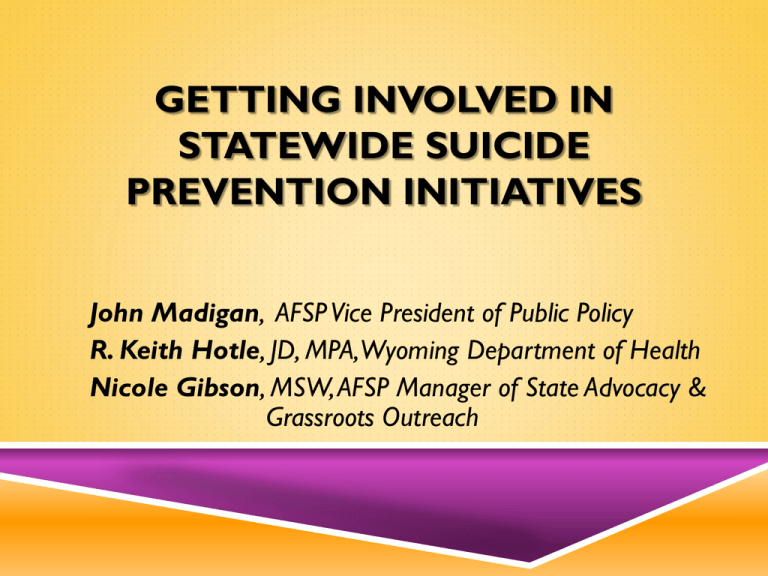
GETTING INVOLVED IN
STATEWIDE SUICIDE
PREVENTION INITIATIVES
John Madigan, AFSP Vice President of Public Policy
R. Keith Hotle, JD, MPA,Wyoming Department of Health
Nicole Gibson, MSW, AFSP Manager of State Advocacy &
Grassroots Outreach
THIS SESSION WILL:
Give an in-depth look at statewide suicide
prevention planning/programming in one example
state – Wyoming
Give guidance to Field Advocates and Chapters re:
getting involved in your own statewide
planning/programming efforts back home
Building Wyoming’s
State Suicide
Prevention Program
R. KEITH HOTLE, J.D., MPA
Chronic Disease, Substance Abuse and
Suicide Prevention Unit Manager
Public Health Division
Wyoming Department of Health
A FEW INTRODUCTORY THOUGHTS
Wyoming’s geographic, demographic & cultural
traits make a lethal combination
If a Country we would be 9th deadliest in the world
9th largest state but least populous
Frontier Isolation
“Cowboy Up” mentality
Politically independent w/libertarian ideals
Social Stigma
Access to Care Issues in most of state
Wyoming Suicide Prevention Death Rates
Year
2002 2003 2004 2005 2006 2007 2008
Number
106
Rate
per
100,000
109
88
84
116
97
119
2009
2010
2011
2012 2013
111
130
127
132
23.06
22.85
21.20 21.65 17.29 16.34 22.19 18.14 21.79 19.83
98
Source: Wyoming Department of Health, Vital Statistics Services (2014)
Wyoming Top 5 Causes of Death (2012)
Cause of Death
Percentage of all
deaths
Rank
Number
1
1173
27.1%
2
919
21.2%
3
319
7.4%
Alzheimer’s Disease
4
153
3.5%
Suicide
5
127
2.9%
2691
62.1%
Major Cardiovascular Disease
Malignant Neoplasms (i.e.,
cancer)
Chronic Lower Respiratory
Disease
TOTAL
Source: Wyoming Department of Health, Vital Statistics Services (2012)
BRIEF HISTORY OF PREVENTION IN
WYOMING
2000
Substance Abuse Division Created by Gov. Geringer
2001
21st Century State Incentive Grant
2004
Strategic Prevention Framework State Incentive Grant
2005
State Suicide Prevention Program
2006
Youth Suicide Prevention Grant (1st Cohort)
2009
Youth Suicide Prevention Grant (2nd Cohort)
2010
Core Prevention Program Begins; SEOW Grant
2011
State Prevention Enhancement Grant-Building the PMO
2012
Prevention Management Organization Funded for Biennium
2014
Legislative Attempt to Dismantle PMO Framework
COMMUNITY PREVENTION SYSTEM
PRIOR TO JULY 1, 2012
State plans
and makes
funding
decisions.
State
contracts with
approximately
40 Fiscal
Agents.
Fiscal agents
hire
approximately
50 Program
Managers.
Program
Managers
organize
and support
local
prevention
coalitions in
each county
(roughly 30
coalitions).
Local coalitions
define and
implement local
strategies.
COMMUNITY PREVENTION SYSTEM
BEGINNING JULY 1, 2012
State
plans and
makes
funding
decisions
State
contracts
with 1
Prevention
Management
Organization
Program
Managers
organize and
Fiscal agents
hire 42 Program support local
prevention
Managers (38
coalitions in
charged with
each county
SA prevention
and 4 regional
suicide
prevention
coordinators
Local
coalitions
define and
implement
local
strategies
2009 State Task Force & WYSPAC Merged into
WySPAC
Suicide in Wyoming (Nov. 2012)
PRIORITY RECOMMENDATIONS
1.
FIREARM SAFETY COALITION: The Governor should establish a Wyoming Firearm Safety Coalition for the purpose of
adopting best practices and tools for gun shop owners and others on how to avoid selling firearms to suicidal persons and how to
educate customers about methods to protect persons at high-risk of suicide from self-harm with firearms (19 votes).
2.
IMPROVE PRIMARY CARE COMPETENCIES: The Wyoming Board of Medicine Wyoming Medical Society,
Wyoming Association of Osteopathic Physicians and Surgeons, Wyoming Association of Psychiatric Physicians, Wyoming
Association of Physicians Assistants, Wyoming Primary Care Association, Wyoming Hospital Association and other stakeholders in
the medical community should collaboratively develop educational competencies and training tools for physicians and physician
assistants for the diagnosis and management of depression, routine screening of clients for mental health issues and suicide, and
suicide intervention (18 votes).
3.
BETTER SUICIDE DEATH DATA: The Board of Coroners Standards should develop and implement uniform standards
for the investigation of cases of apparent or suspected suicide and for collecting and reporting of suicide death data (16 votes).
4.
EMERGENCY ROOM GUIDELINES: The Wyoming Hospital Association, Wyoming Medical Society, Wyoming
Emergency Nurses Association, Wyoming Trauma Coordinators, Wyoming Office of Emergency Services and other stakeholders in
the emergency medical services community should collaborate to create and implement uniform guidelines for emergency room
treatment, discharge and post-discharge follow-up for suicidal patients (15 votes).
5.
MENTAL HEALTH PROFESSIONAL EDUCATION: State licensing boards should require suicide-specific
continuing education as a requirement for the renewal of every mental health professional’s license (14 votes).
6.
MIDDLE-AGED MAN CAMPAIGN: A statewide media campaign should be implemented to reduce stigma and
encourage Wyoming men between ages 20-60 to seek help for depression and suicidal thoughts; because this span of years
encompasses both young adult males and middle-age males, multiple messages should be considered (14 votes).
7.
STATE EMPLOYEE TRAINING: The Wyoming Departments of Family Services, Health, Workforce Services and other
state agencies should develop and implement mandatory staff training on suicide risk recognition and response for all personnel
who have direct contact with individuals at risk for suicide and their families (12 votes).
2013 ACTIVITIES
Innovative Assessment Tool
Middle Aged Man Social Marketing Campaign piloted
FC BIT – implemented and moving towards NREPP
Community Coalitions in 22 of 23 WY counties (doubled previous
levels)
School Suicide Prevention – Support and TA
Trainings -- 291 trainings; 7,698 people trained
Psychological Autopsy Training brought to Wyoming
Community Critical Response (Postvention Services)
Campbell County Comprehensive Suicide Prevention Project
AMERICAN FOUNDATION FOR SUICIDE
PREVENTION (AFSP)
Last year the PMO collaborated with AFSP Wyoming Chapter to:
Facilitate two Bipolar Education Events in May 2013, held in Sheridan and
Cody.
Host the Cody Out of the Darkness Walk on September 7, 2013, also in
collaboration with the Park County Suicide Prevention Alliance. More than
$25,000 in cash and donations were received; 182 people participated in the
walk.
Fund six Applied Suicide Intervention Skills Training (ASIST) workshops.
Conduct International Survivors of Suicide broadcasts on November 23,
2013. The broadcasts were held in Casper, Riverton, Sheridan, Gillette and
Cheyenne.
The PMO: Case Study in State and Local
Political Manipulation
2011 Move to Single Statewide Management Entity
• Pushback from WAMHSAC Providers
• Held Community Meetings
• Decision to Move Forward
2012 Implementation Begins
• Mandate was Community Collaboration (even when it was
hard)
• Persistent Problem Areas – Campbell, Natrona esp.
• Significant Accomplishments in Suicide Prevention
• Generational Opportunity
• Governor Support
• Decision to use Public Procurement Process for 2014-15
February 18-21 – Budget Session Shenanigans
•
•
•
•
Tuesday - Blindsided
•
2 p.m. by Monday’s (Presidents Day) floor remarks by Senator Scott
•
Tuesday night – transcribed and rebutted with issue brief and talking points
Wednesday – The Battle Begins
•
11a.m. Discovered Matching Amendments filed in Senate and House
•
11 a.m.-Noon: Last minute efforts to survive second reading vote; mobilized
with talking points and PMO Report Card
•
1:30 p.m. – meeting with Senator Schiffer in Capitol Anteroom
•
2 p.m. – afternoon sessions begin
•
Doors close and unable to reach any House Representative
•
2:30 p.m. JAC Chairman Bebout gets talking points during session
•
4 p.m. – Senate and House floor debates on budget amendments
•
Amendment is killed in Senate but passes House
•
Wednesday night is strategic planning and engagement of resources
Thursday – Desperate Hours
•
WASCOP takes the stage [law enforcement on the attack]
•
other statewide grassroots efforts to reach House representatives
•
Amendment 17 filed
•
Both sides jockeying for upper hand – TV interviews
•
Discovery of WAMHSAC secret email [“Aha” moment]
•
late night discussions with House representatives
Friday – The Drama Plays Out
•
last minute outreach and education efforts
•
distribution of talking points and supporting materials on House floor
•
early morning discussions with House representatives vote; 43-14 win
SUICIDE PREVENTION INITIATIVES 2014-15
• Strategic Communication Plan & Regional Roundtables
• August 2014 Stakeholder Summit
• Middle Aged Man Social Marketing Campaign replicated
• FC BIT – implemented as part of Berman Legacy Project
• Community Coalitions – build capacity
• School Suicide Prevention – Support and TA
• Community Trainings – Goal is 5% of Total Population (@
27,000)
• Psychological Autopsy Project Initiation
• Community Critical Response (Postvention Services/CIT)
• Online State Employee Training
• Campbell County Comprehensive Suicide Prevention Project
o
Move from Planning to Implementation
TYING IT ALL TOGETHER…
Getting involved in your OWN state’s suicide
prevention efforts is important, and doable,
for Field Advocates and Chapters!
TYING IT ALL TOGETHER…
Your state may be very similar to, or very different
from, our Wyoming example in terms of:
Strengths
Challenges
Structures
Players
FIELD ADVOCATES AND CHAPTERS CAN:
Read and familiarize yourself with your state’s
statewide plan/strategy
Web links provided in the “Statewide Initiatives and Projects”
handout
Contact the Public Policy Office to find out who
your state’s players are
Act as a liaison between other players and AFSP
FIELD ADVOCATES AND CHAPTERS CAN:
Attend local/statewide coalition meetings
to learn what is going on
Get the OK from the Public Policy Office and your
Field Staff to wear your “AFSP” hat at those meetings
Where there is no organized statewide or local
activity, AFSP can be the driving force for
bringing the players to the table
QUESTIONS? OTHER IDEAS?
For those who have been involved in
statewide programming/planning, what did
you learn/what advice do you have for your
fellow Field Advocates/Chapter volunteers?
What questions do you have for us/Keith?
Thank you!

